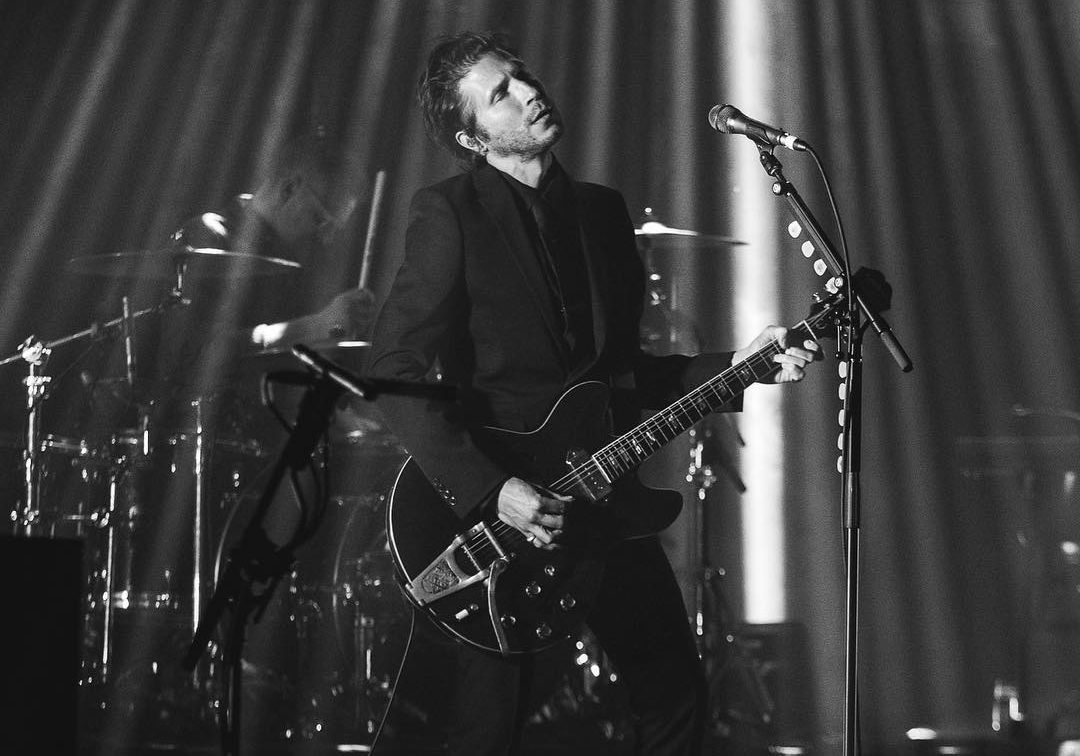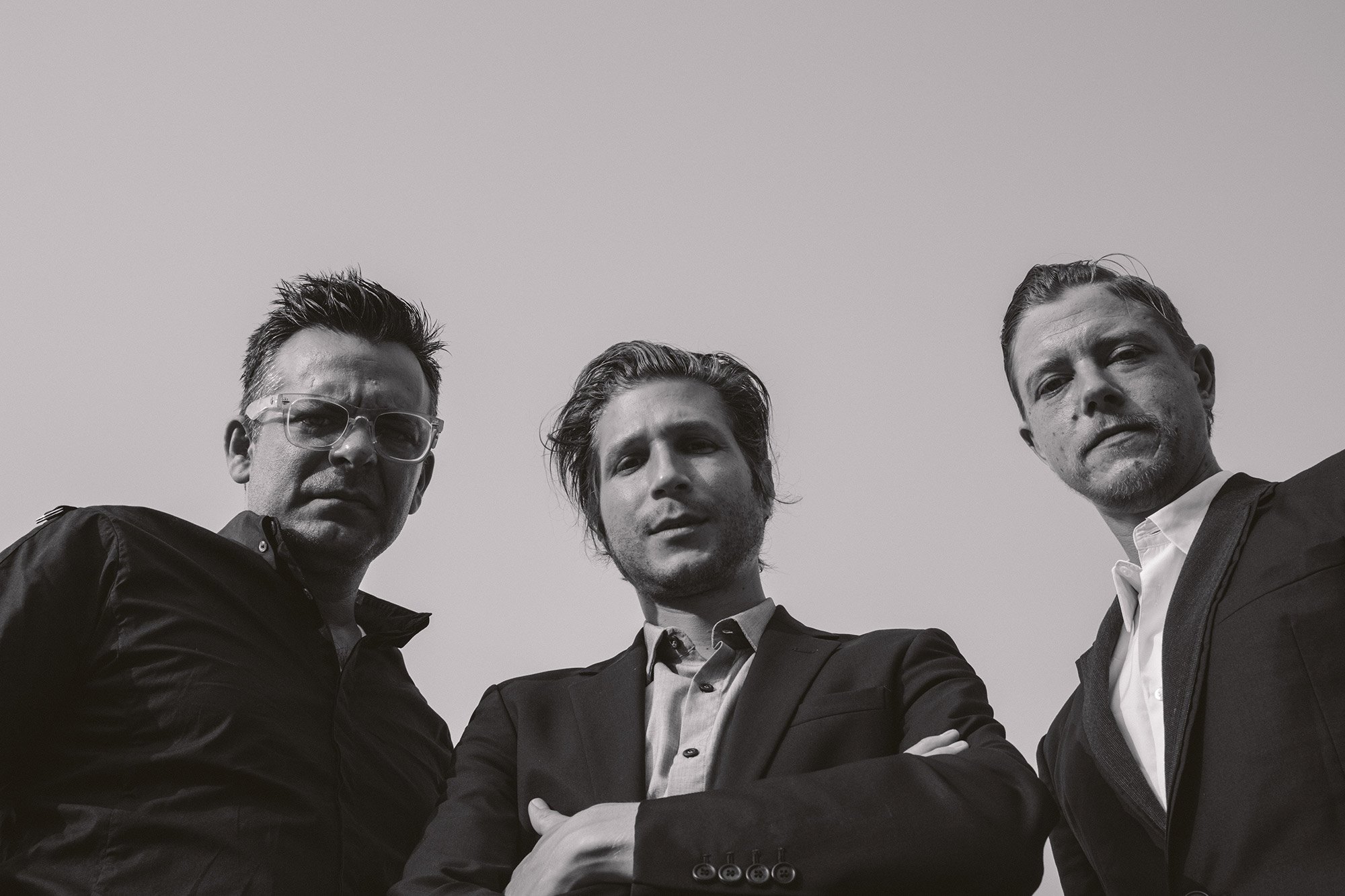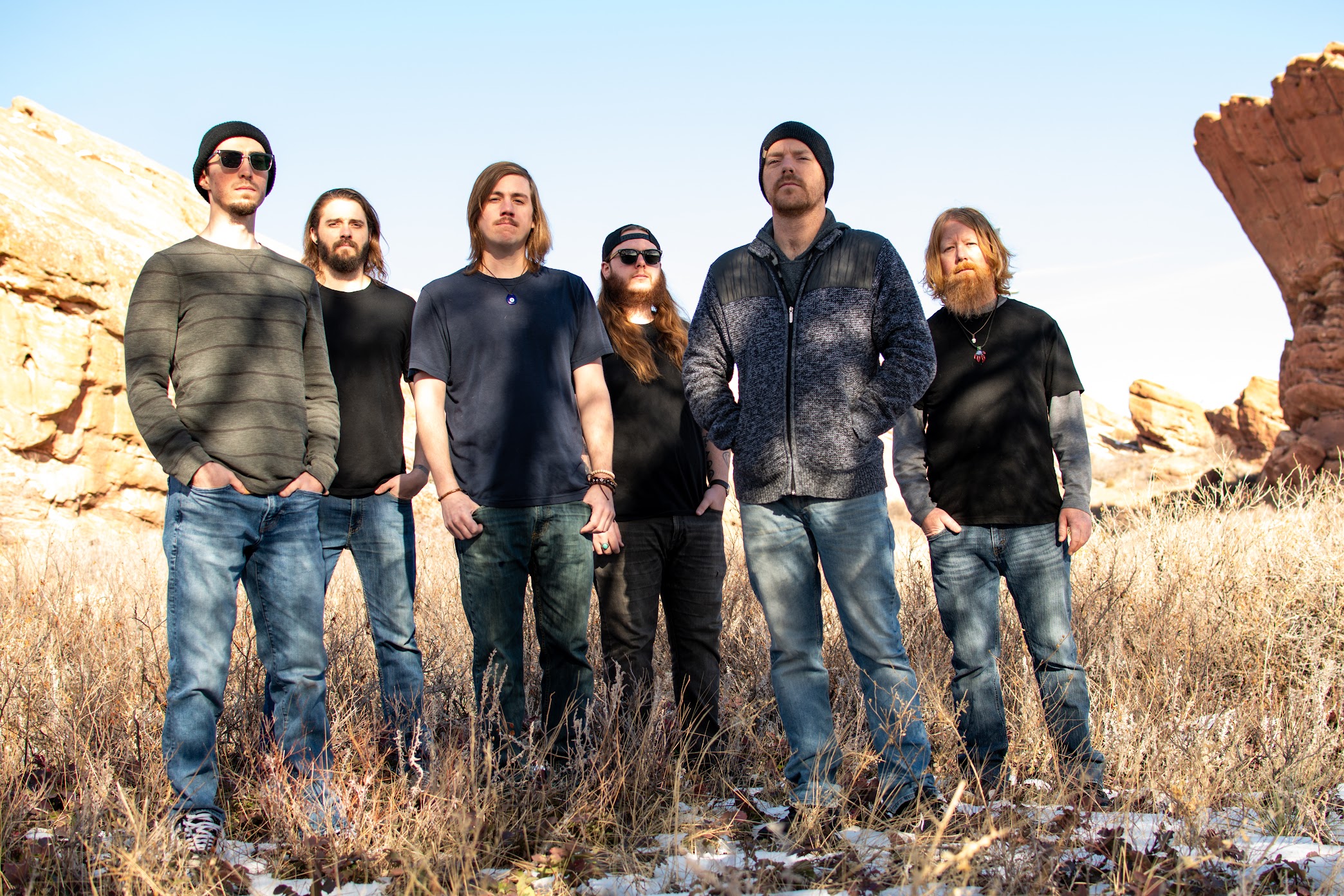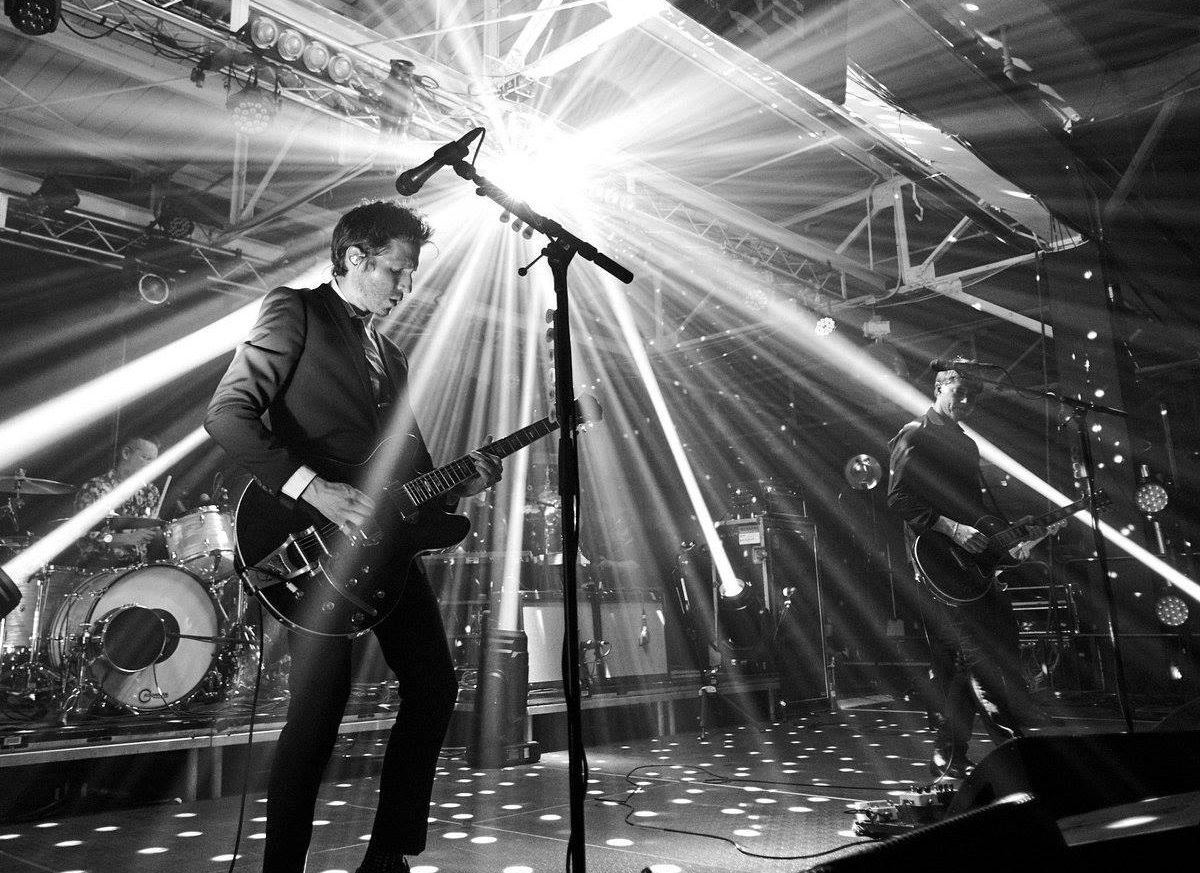Let’s take a trip to the late ’90s to early 2000s and imagine a world where CBGB’s wasn’t just a landmark and the East Coast held a signature sound you could hear if you put your ear to the concrete. Amongst the many bands shaping this era, Interpol managed to leave its mark and emphasize the nitty gritty scene of New York City rock more than most. In today’s world, rock ‘n’ roll has evolved, and with it, many bands from previous decades choose to stay where they’re comfortable and watch the evolution from their space in music history. Interpol doesn’t want their legacy to exist in a vat of nostalgia. They continue propelling forward and make records they’re proud of that also resonate with today’s popular culture.
The Interpol sound is inescapable and in many ways, timeless, but their new record — Marauder — leaps through the hoops of what we’ve come to expect of a band that evokes such a specific era of music so seamlessly. We talked to Interpol’s lead guitarist, Daniel Kessler about the evolution of music, their new album Marauder and how they finally made their way to Red Rocks after almost two decades of stardom.

303: Interpol has a very specific New York indie-rock sound cemented through the early 2000s. Coming from such a solidified and classic indie-rock history and large following, how do you feel about the trajectory of modern indie-rock?
DK: I think you just got to really have to go with the flow of things and just accept them. I’m not overly focused on what’s going on and the development and changes. These things are just beyond anyone’s control. I’m a bit more focused on the things that we can control. And I think that what does interest me as far as like our sound, we’re just trying to do what works best for us. I remember when our second record leaked. Literally, like a couple of weeks after we finished it and three months before it was released. That was sort of very much the moment of welcome to the tide of piracy and so forth. With that, I wasn’t lamenting thinking “Oh my God, no one’s paying for this” it was more like, you gotta go with the flow a little bit and see where this thing’s going to end up. I feel like it’s just more interesting times and it’s hard to sort of figure out the scope of it. I just follow music that interests me and I don’t think too much about what kind of music, where it comes from. So I just follow things. If I like it, I like it. I think most of us sort of gravitate in that direction. But I’ve always been that way. I’ve always liked a lot of electronic music, a lot of temp music. I bought things that interested me and tried to stay away from boxing everything in.
303: I would argue that although indie rock has changed a bit, there are also other great genres that have come to the surface that were maybe not as represented. So time just kind of changes the tides and that’s great that we have the opportunity to listen.
DK: Yeah. It goes back and forth. You can think it’s the end of something and then it kind of resurfaces as a cycle and it’s certainly an interesting time in music overall. I think for me, what excites me the most is that in some ways music is going to get egalitarian in time. If you live in a remote location without a cool record store, but you have a very specific taste that is more on the obscure side, you’re not punished for that. You can get those records, you can pursue that interest. And I like that. That’s something that wasn’t the case when I was a kid and it’s been very much the case since the early 2000s more or less in one way or the other. So I think that in that sense from a global perspective, I think it’s an exciting time. Also, people can make music from all over the world and you can hear their perspective from the other side of the world and I think that there’s something great about that. I think more in those terms than the changes as a negative thing. You can borrow from each other and influence each other in a truly conducive way, you know?
303: That totally makes sense. On the topic of pulling from other influences, your last tour in 2017 was a throwback with you playing your debut album Turn On The Bright Lights. This was around the same time as you were planning out and working on Marauder, your newest album. Did that touring experience inspire you guys as a band throughout the writing process?
DK: I think it didn’t really influence the sound or the direction or the identity of any of the songs. We basically, when it came time to start rehearsing Turn on the Bright Lights, Marauder musically was probably like 95% finished as far as songwriting. The thing that was very different for us was to be completely focused on a new record when traditionally, we tour our new record first and then disappear for a while. You start writing new songs and you get very much in the woods of focusing on this new material and you’re only thinking about that and not really looking backward. You go through the process of making a record and then you can’t wait to take this record live because you’ve been in the studio for six months. That’s usually the process. And then, all of a sudden, when we were 95% finished [with Marauder] as far as actual songwriting, putting it aside and doing something distinctly different was definitely an interesting spin. It was more of just putting all this energy into the next chapter and all of a sudden you’re going to ignore it to go out and do a tour of different material. It felt very vulnerable in the sense that I wasn’t ready, almost mentally ready, to go out on tour after writing something and having it incomplete in some way. But it was an incredible experience. I think the two most key things out of that whole tour besides it being a pleasure, really flattering and humbling, were playing live for so long on tour meant we were very tight as far as instruments go and I think the experience of just neglecting it for five months, doing something completely different, and then picking everything up and feeling assured that — yes — this is what we want to say next.
303 Magazine: Speaking of Marauder, I heard it was recorded entirely on two-inch tape with Dave Fridmann, who’s a legend by his own rite. How was the recording process like given this method?
Daniel Kessler: We’ve always recorded portions of our records on two-inch tape, but usually, at a certain moment, we switch over to pro tools just to make it a little bit more expedient and so forth. We usually don’t enter the studio until the songs have a pretty strong foundation. They’re pretty constructed, the beginning, middle the end. We don’t write too much in the studio. We don’t try to figure out middle sections of songs in the studio, so I think from that, he [David Fridmann] saw that the songs had potential to do two-inch tape and record the whole process from start to finish. I don’t think he gets to do that too often. Quite often these days, bands sort of write in the studio. It was a bit of a challenge in a good way for us within that realm. It also spoke to the character of the songs we were writing in the sense that they were kind of raw, they were very lively, there was a bit of urgency to them. Yeah, it was a really great experience.
303: The evolution of your sound as a band has been a big topic as well thanks to the latest album. There’s definitely the familiar Interpol signature sound but that being said, songs like “If You Really Love Nothing” and “It Probably Matters” feel a bit like new territory. How did this evolution of sound come to pass?
DK: I think we’re a band after all these years because we still feel ourselves moving forward. We’re never short of ideas when we’re all in the room working on the songs and so forth, which is very fortunate, but it’s true. So I think what keeps us together as a band is that when we are in the room and there’s a new song on the table, we’re pretty good at focusing in on it and driving it forward and kind of figuring out the next chapter of our band — it’s sort of inherent. I feel like it’s something that I think your experience and time doing this, hopefully, it makes you better at doing it. You have a bit more of a “know how.” If you hear something in your head, how to sort of capture that sound and how to communicate with each other is important. This album started with me playing a lot of the songs, specifically writing [them] and the progressions, and Paul [Banks] on the bass guitar and microphone set up and as much as we did that on El Pintor, it still feels very new to have this kind of approach as far as how we’re going to create a foundation to the songs. Right off the bat though, “If You Really Love Nothing” And “The Rover” were the first few songs that we worked on and right away, Paul had the vocal melody. He didn’t hesitate to choose a direction to take [with] the bass. At that moment it had this sort of familiar, exciting, [feeling] when it takes a turn for the better and you leave the rehearsal suddenly euphoric about what just transpired. It’s a similar feeling that I’ve had since before we ever had a record deal. And I have to say that happened pretty frequently during this writing process. I also think to be able to work with Dave [Fridmann] sort of pushed us in a new direction as well, which felt very healthy and very organic. Nothing felt forced.
303: You’re also releasing an EP titled A Fine Mess on May 17. Can you elaborate on what we should expect from this release?
DK: We were writing and it was a very fruitful period for us. We very much had the mindset that we didn’t just want to do a record. We wanted to focus on the EP as well. We didn’t want to make it feel like an EP of leftover material or extra tracks. We wanted something that was equal in strength to the songs on Marauder, but also having a separate place and piece. And that’s what came out of it. [A Fine Mess] essentially is five songs that we feel could have been on Marauder but they’re not. Dave Fridmann did the production on them, we also did some additional production, and it’s just all very fresh. We knew we’d be very busy for the second half of 2018 and certainly this year we’re pretty much busy all year. It was something that really was important to us, to try to have something in between come out while we’re still touring and after Marauder’s release. It’s something that we feel really good about and we can’t wait to share.

303: Red Rocks is a staple venue for a lot of bands. How do you feel about headlining the venue?
DK: I mean, it’s an incredible honor. I’ve never been there. It’s one of those venues where you just say “Red Rocks” to people all over the world and their eyes light up. There are very few venues that you can actually say that and everyone knows exactly where it is, why it’s special and so forth, without even having been there. So it’s really incredible to see that. It’s a privilege to be able to go there and play. I never thought I’d have that opportunity. I love it when the first time I get to go to a storied venue, it’s to play. I feel like that’s a really remarkable thing and I’m really looking forward to it. It’s great that we get to kick off this leg of the tour out there.
Read: Staff Picks – Our 16 Most Anticipated Red Rocks Shows of 2019





